Home![]() books
books
![]() ecology
ecology![]() Latest info
Latest info![]() from space
from space
![]() Encyclopedia
Encyclopedia![]() Animals
Animals![]() Plants
Plants![]() Climat
Climat![]() Research
Research![]() The world beneath Baikal
The world beneath Baikal![]() Geology
Geology![]() Circumbaikal railroad
Circumbaikal railroad![]() Photogallery # 1
Photogallery # 1![]() Photogallery # 2
Photogallery # 2![]() Photogallery # 3
Photogallery # 3![]() Listvyanka
Listvyanka![]() Natives
Natives![]() In German
In German![]() Word of poet
Word of poet![]() Olkhon island
Olkhon island![]() Earthwatch
Earthwatch
![]() Shopping
Shopping![]() Travel agences
Travel agences![]() Guestbook
Guestbook
![]()
Trans-Siberian railway
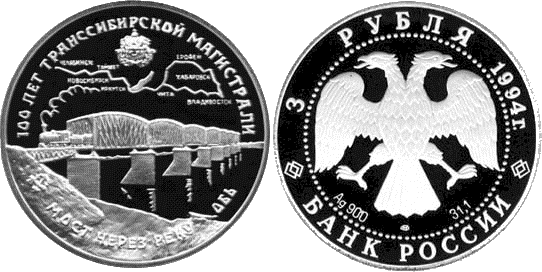
The coin issued by bank of Russia by 100 years anniversary.
 In the 17th and 18th centuries the principal Russian
interest in Siberia was the highly profitable fur trade. Great quantities of
Siberian furs were exported, first to Europe and later to China. During this
period the Russian population of Siberia remained small, limited by difficult
communications, harsh climatic conditions, and restrictions on migration from
European Russia. Large-scale migration began only in the mid-19th century; it
grew spectacularly in the last few decades of czarist rule. This influx was
encouraged by overpopulation in some areas of European Russia, the abolition
of serfdom in 1861, and the building of the Trans-Siberian Railway from 1891
to 1900, which greatly facilitated transportation and communications.
In the 17th and 18th centuries the principal Russian
interest in Siberia was the highly profitable fur trade. Great quantities of
Siberian furs were exported, first to Europe and later to China. During this
period the Russian population of Siberia remained small, limited by difficult
communications, harsh climatic conditions, and restrictions on migration from
European Russia. Large-scale migration began only in the mid-19th century; it
grew spectacularly in the last few decades of czarist rule. This influx was
encouraged by overpopulation in some areas of European Russia, the abolition
of serfdom in 1861, and the building of the Trans-Siberian Railway from 1891
to 1900, which greatly facilitated transportation and communications.
![]() History
of Trans-Siberian
railway. streaming RealVideo
History
of Trans-Siberian
railway. streaming RealVideo
![]() Webpage
about Trans-Siberian Railway in Russian
Webpage
about Trans-Siberian Railway in Russian
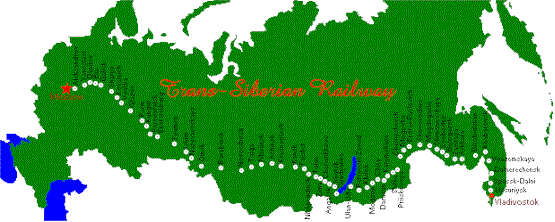
The use of Siberian exile for punishment of criminals and political offenders began almost immediately after the conquest, but accelerated with the rise of the Russian revolutionary movement in the 19th century.
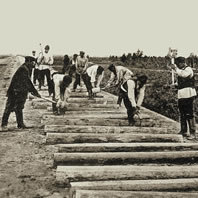 |
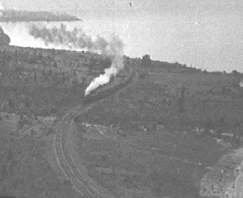 |
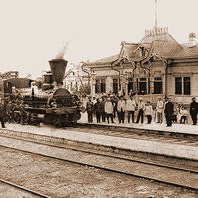 |
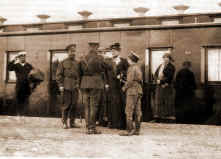 |
The Trans-Siberian Railway greatly influenced the composition and size of the population of Siberia.
After the railroad’s completion in the early 1900s, Russian people migrated to Siberia in much larger numbers than before, greatly increasing Russian presence in the region. Tsar Alexander III conceived of the railroad in the late 19th century, and construction on several sections took place simultaneously.
The Trans-Siberian Railroad links the economy of Siberia with the rest of the
world. The railroad, which has fueled the development of trades and industries
in Siberia, has led to an associated population growth in the region. The
longest railroad in the world, the 8000 km (5000 mi) Trans-Siberian crosses a
vast area made up mostly of the Asian part of the former Soviet Union.
![]() Transsiberian
railway. RealVideo
Transsiberian
railway. RealVideo
![]() Inside
the train at Transsiberian railway,download .mov 468kb
Inside
the train at Transsiberian railway,download .mov 468kb

Irkutsk portion of the old Trans-Siberian railway, in the area of the newly-built bridge. |
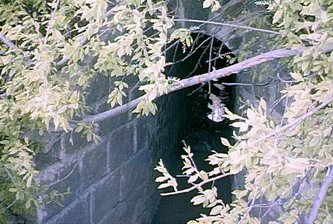
Old water drainage under railway. |
Circumbaikal Railway
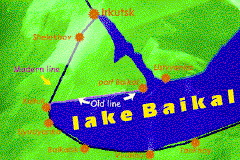 The
construction of the Circumbaikal Railway
encouraged the further investigation of the lake. A large hydrogeographical
expedition headed by F. Drizhenko (1896-1902) gave a detailed atlas of the
Baikal depths and its sailing directions that are used by the Baikal sailors up
to this day.
The
construction of the Circumbaikal Railway
encouraged the further investigation of the lake. A large hydrogeographical
expedition headed by F. Drizhenko (1896-1902) gave a detailed atlas of the
Baikal depths and its sailing directions that are used by the Baikal sailors up
to this day.
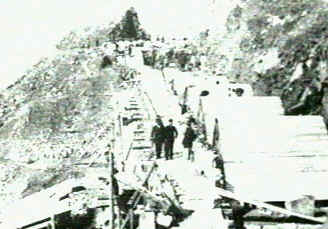 |
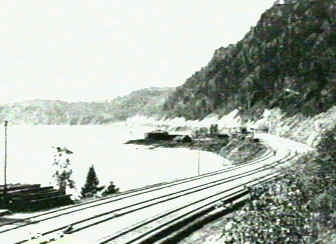 |
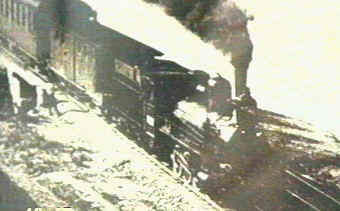 |
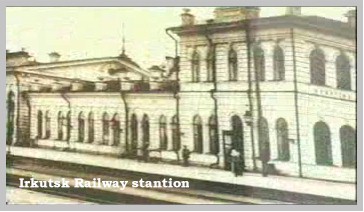 |
The construction of the Circumbaikal Railway as part of Trans-Siberian Railway (the section from Port Baikal on the south-western shore of the lake) to Mysovaya Station (on the south-eastern shore) took 4 years.
 Ancient crystal rocks, granite, gneiss, gabbro, diabases, possess enormous strength;
the steep rocky shores precipitously go under water, forcing railroad builders
to make excavations and niches in rocky cliffs, and to construct arches and
tunnels. The railway is 84 km long. It includes not only Russian engineering
design of that time but also the hard work of Russian, Polish, Italian and English
workers. The Circumbaikal Railway needed 200 bridges and 33 tunnels. Within
the 56-mile section from Kultuk to Port Baikal alone there are 48 arches and
tunnels. And how many bridges and supporting walls! It is no coincidence that
this part is rightly regarded as the museum of Russian engineering thought,
and foreign tourists respectfully name it the golden buckle of the Great Siberian
Trail.
Ancient crystal rocks, granite, gneiss, gabbro, diabases, possess enormous strength;
the steep rocky shores precipitously go under water, forcing railroad builders
to make excavations and niches in rocky cliffs, and to construct arches and
tunnels. The railway is 84 km long. It includes not only Russian engineering
design of that time but also the hard work of Russian, Polish, Italian and English
workers. The Circumbaikal Railway needed 200 bridges and 33 tunnels. Within
the 56-mile section from Kultuk to Port Baikal alone there are 48 arches and
tunnels. And how many bridges and supporting walls! It is no coincidence that
this part is rightly regarded as the museum of Russian engineering thought,
and foreign tourists respectfully name it the golden buckle of the Great Siberian
Trail.
![]() Circumbaikal
railway streaming RealVideo
Circumbaikal
railway streaming RealVideo
 |
 |
 |
 |
 |
 |
 While
the Trans-Siberian section
While
the Trans-Siberian section
was under construction, the Russian government placed an order in Newcastle, England, for a ferry/ice-breaker Baikal, which could hold 24 cars and one locomotive on its middle deck. It took the ice-breaker 4 hours to carry the train from one shore to the other. Up to 1916 the icebreaker served on the railway as a reserve variant because trains used to come off the rails frequently. The icebreaker was destroyed by burning during the Civil War.

The ice-breaker "Angara" 10 years ago. |

The ice-breaker "Angara" now |
|
 |
 |
Three years later after Baikal, an ice-breaker Angara was also built in England for carrying cargo and passengers. Both of these Baikal giants were assembled in Listvyanka, on the southwestern shore of the lake, where a shipyard was built especially for this purpose.
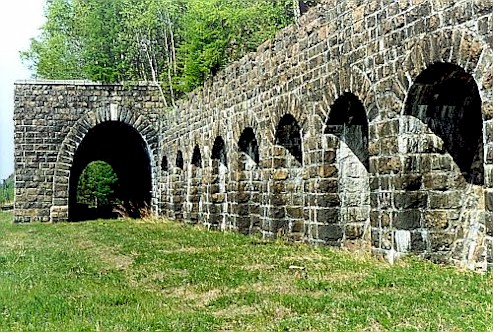
The railway, its construction and exploitation, had been preceeded by great scientific activities in investigating the geology, hydrology, climate, and seismics of Baikal on the whole, as well as the territory throughout which the road was lain and exploited for years.
If you are going to travel along the Old Circumbaikal Railway you can download a detailed map //(1066Kb) of it by clicking here:
Before the commissioning of a Circumbaikal railway in 1905, the "Baikal" together with the ferry-icebreaker "Angara" crossed the lake twice a day, connecting the coasts and transporting cargo on the Baikal.
![]() Circumbaikal Railway
Circumbaikal Railway
![]() Circumbaikal Railway
Circumbaikal Railway
![]() Old
pictures of the Circumbaikal Railway
Old
pictures of the Circumbaikal Railway
Images of the Baikal of talanted photographer Vadim Paseka:
- travel to Bolshaya Goloustnaya river
- travel to Buguldeika river
Search at Amazon.com book department with keyword "trans-siberian"
Home![]() Books
Books ![]() Ecology
Ecology![]() Latest
info
Latest
info
![]() from
space
from
space ![]() Encyclopedia
Encyclopedia
![]() Animals
Animals![]() Plants
Plants![]() Climat
Climat![]() Research
Research![]() The world beneath Baikal
The world beneath Baikal![]() Geology
Geology![]() Circumbaikal railroad
Circumbaikal railroad![]() Photogallery # 1
Photogallery # 1![]() Photogallery # 2
Photogallery # 2![]() Photogallery # 3
Photogallery # 3![]() Listvyanka
Listvyanka![]() Natives
Natives![]() In German
In German![]() Word of poet
Word of poet![]() Olkhon island
Olkhon island
![]() Earthwatch
Earthwatch
![]() Shopping
Shopping![]() Travel agences
Travel agences![]() Guestbook
Guestbook
realvideo
![]() Transsiberian
railway.
Transsiberian
railway.![]() Inside
the train at Transsiberian railway,download .mov 468kb
Inside
the train at Transsiberian railway,download .mov 468kb![]() Circumbaikal
railway
Circumbaikal
railway![]() Lake
Baikal beauty
Lake
Baikal beauty![]() Yachts
at Baikal
Yachts
at Baikal![]() Brown
bears at lake Baikal shores in spring
Brown
bears at lake Baikal shores in spring![]() Aqualangist
under Baikal ice
Aqualangist
under Baikal ice![]() At
lake Baikal beneath
At
lake Baikal beneath![]() Baikal
nerpas
Baikal
nerpas![]() History
of Trans-Siberian
railway
History
of Trans-Siberian
railway
![]()
|
|
|